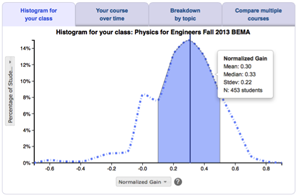
Developed by: David P. Jackson, Priscilla W. Laws, and Scott V. Franklin

middle schoolhigh schoolintro collegeinter-mediateupper levelgrad school other

conceptual




Overview
What? A sequence of introductory, activity-based, laboratory activities that integrate the use of guided-inquiry techniques with self-directed projects to help non-science majors appreciate science, understand the process of scientific investigations, and master physics concepts.
Why? EiP allows you to incorporate small-group activities that guide students through the process of scientific inquiry into your course for non-science majors. Each unit is independent offering flexibility. EiP was designed for small classes in a studio setting, but can be adapted for a lecture setting.
Why not? The EiP materials are out of print and there are not many supporting materials or professional development opportunities to learn to use them.
Activity outline
| Academic Calendar | Class Schedule | Core Material | Student Projects |
|---|---|---|---|
| Semester | 3 hrs/week | 1 Unit | 1 Full Project |
| 6 hrs/week | 2 Units | 2 Full Projects | |
| Quarter | 3 hrs/week | 1 Unit | 1 Shortened Project |
| 6 hrs/week | 2 Units | 1 Full Project |
Topic outline
- Unit A: Force, Motion, and Scientific Theories
- Unit B: Light, Sight, and Rainbows
- Unit C: Heat, Temperature, and Cloud Formation
- Unit D: Buoyancy, Pressure, and Flight
Student skills developed
- Conceptual understanding
- Lab skills
- Making real-world connections
- Designing experiments
Instructor effort required
- Medium
Resources required
- TAs / LAs
- Computers for students
- Advanced lab equipment
- Tables for group work
- Studio classroom
Resources
Teaching Materials
Explorations in Physics comes in a book that was originally published by Wiley but is now out of print. You can download a pdf version of the book for free from Dickinson College or order it from Amazon.
Research
This is the third highest level of research validation, corresponding to:
- at least 1 of the "based on" categories
- at least 1 of the "demonstrated to improve" categories
- at least 1 of the "studied using" categories
Research Validation Summary
Based on Research Into:
- theories of how students learn
- student ideas about specific topics
Demonstrated to Improve:
- conceptual understanding
- problem-solving skills
- lab skills
- beliefs and attitudes
- attendance
- retention of students
- success of underrepresented groups
- performance in subsequent classes
Studied using:
- cycle of research and redevelopment
- student interviews
- classroom observations
- analysis of written work
- research at multiple institutions
- research by multiple groups
- peer-reviewed publication




